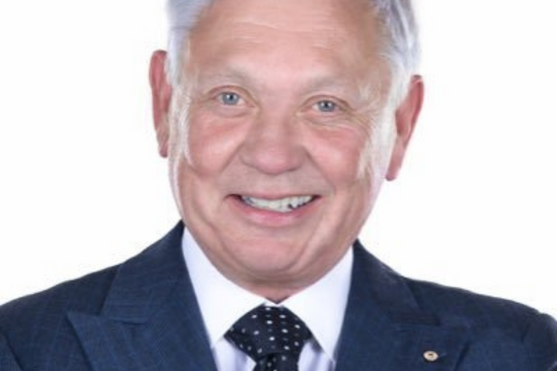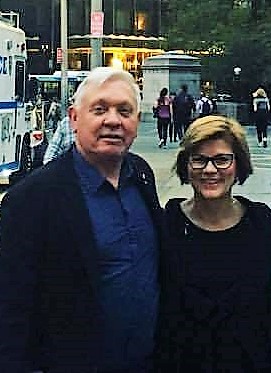
Paul Wheelton’s philanthropic journey is a story that’s still unfolding. Like the man himself, his philanthropy is distinguished by high engagement and a tremendous spirit of personal generosity.
“This whole thing is a journey,” says the Melbourne-based business owner.
“All my life I’ve always had the desire to keep learning. Right now, I’m doing my PhD in hindsight—I’ve made enough mistakes to hopefully keep learning going forward!” he says with a deep chuckle.
One of the biggest learnings, Wheelton says, was pausing after years of business success as the owner of Australia’s largest Budget Rent a Car franchise group, to ask himself a very personal question.
“It was the fundamental question of ‘When is enough, enough?’” he says.
“I looked around and saw people who’d been on the same entrepreneurial journey as me who just kept building more businesses and I thought, ‘I’ve got enough. Do I spend the rest of my life doing the same thing or should I go down a different path and try to make a difference with what I’ve been fortunate enough to receive?’”
Raised with “old-fashioned Christian values”, charity has always played an important role in Wheelton’s life, but the realisation that it was time to bring greater intentionality to his giving spurred him to create Wheelton Philanthropy, a charitable trust with Lord Mayor’s Charitable Foundation. He wasted no time getting down to business.
“I said to my children, ‘You’ll get a house when you turn 21, but that’s it. Don’t count on anything else.’”
Wheelton admits that the philanthropy learning curve was a steep one.
“My first experiences were not that great,” he says plainly. “I didn’t really know what I was doing, but someone would ask you to donate to this or that so I did, but there wasn’t much of a plan behind it.
“The real positives came when I started to mix with people in the philanthropic space where there are so many smart and talented people. The learning you get from the likes of Catherine Brown [Lord Mayor’s Charitable Foundation], Sarah Davies [Philanthropy Australia] and Vedran Drakulic [Gandel Philanthropy] is tremendous and helps you see the advantages of collaboration.”
“The biggest thing I’ve learned is that there are a lot of passionate people out there starting not-for-profits but more than passion is needed to make change. There are too many not-for-profits—so many of them have the concept right, but end up duplicating the work of others.
“Sometimes I’ve funded things where, if I’d done a bit more due diligence, I would’ve picked up on the fact that there was already another organisation doing it better and I would’ve encouraged them to join up with them instead of creating another administration to do the same thing.”
Supporting women and girls
Education and health are the twin priorities for Wheelton Philanthropy which targets its support towards women and girls in those areas. Recognising the outsized impact of supporting women and girls was something Wheelton experienced firsthand through his longstanding charitable work in Bali.
“We could see that it was always the boys who were given the advantage of education—the girls were generally kept at home to do domestic labour. We’ve put a lot of work into the Bali Children Foundation over the years, and introduced an English program and computer skills and now we have 28 young girls who are attending university.
“UN studies show that 90 per cent of what a girl earns will flow back to her family and community.”
Wheelton Philanthropy is about to embark on a longitudinal study that will follow 10 Balinese girls who are supported to go to university for the next decade in order to evaluate outcomes and impacts upon the girls’ local villages, families and themselves.
“When we’ve got that research, I’m confident we’ll be able to convince the government that supporting women and girls is not just about gender equity, but that there are also economic benefits. I think that lesson will be applicable here too, not just in Indonesia.”
Wheelton, who has three daughters, one son and a ‘fur baby’ (beloved dachshund, Bella), has long been aware of how gender impacts opportunity.
“I’d seen it in what was open to my own girls, and even before that, I’d seen it with my sister and me—I had a lot more opportunities than she did,” he says.
Upping the ante on gender is one of Wheelton’s latest commitments, having become a signatory to the global Women Moving Millions campaign by pledging US$1 million or more to initiatives that benefit women and girls.

In September, Wheelton and his wife, Angela (pictured together in NYC at left), journeyed to New York with Australian Women Donors CEO, Julie Reilly, to attend the Women Moving Millions (WMM) Summit. Wheelton was the only male delegate.
“Paul understands the value both of investing in women and girls, and of being part of a donor community with a gender focus in common,” Reilly says.
“He is extremely open to learning, he’s not tripped up by ego and he is keen to maximise the impact of the Wheelton Foundation.”
Wheelton says the “lack of ego” in the room at the WMM Summit made a strong impression upon him.
“It made me realise that these things don’t have to run with heavy egos,” he says.
“There’s real power in a community of like-minded donors and here were people getting together to share their learnings and support each other which, for me, was a different experience and a very positive experience. No one was telling you where you should invest, they were just saying as long as you’re investing in women and girls how can we help you get a better result?”
“It really reaffirmed my commitment, and now that Angela has retired, we’re going to do much more going forward as a team.”
“It’s important that men are involved and coming along on the journey to break the glass ceiling,” Wheelton continues. “That’s why I’m a fan of the He for She campaign. All of us should be involved in achieving gender balance.”
True to his word, Wheelton’s commitment to gender equity extends beyond his philanthropy. As Deputy National Chair of the Order of Australia Association, Wheelton is pushing hard for greater diversity in the nominations the Order of Australia receives and has himself nominated 12 women this year.
“We need to nominate more women. End of story,” he says.
The endgame
When quizzed about his philanthropic endgame, Wheelton, who is a vocal advocate of giving while living, doesn’t miss a beat.
“The endgame is to have an end game on everything we’re doing,” he says.
“If you don’t have a sense of what that looks like for every project you’re involved with then you’ll end up writing cheque after cheque. You’ve got to ask yourself, ‘How do we move on this?’ and accept that you’re not going to be around forever.”
“We’re ramping our philanthropy up over the next three years,” Wheelton continues.
“One hundred per cent of what we make in our businesses is going to be donated. We don’t need more money personally for ourselves—we know when enough is enough.”
Find out more about Philanthropy Australia’s Funder and Networking groups and events where the philanthropic sector comes together to learn and share experiences.
For details about Women Moving Millions contact the Australian Women Donors Network.